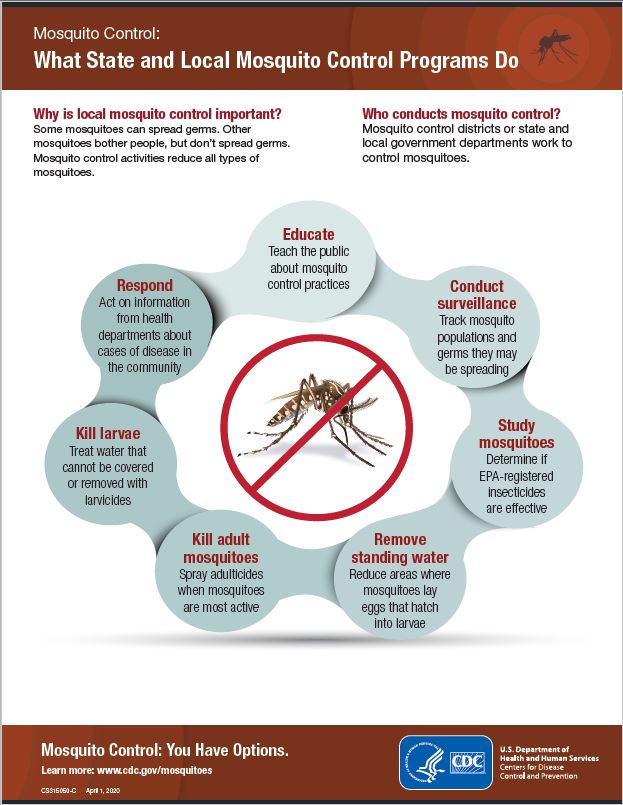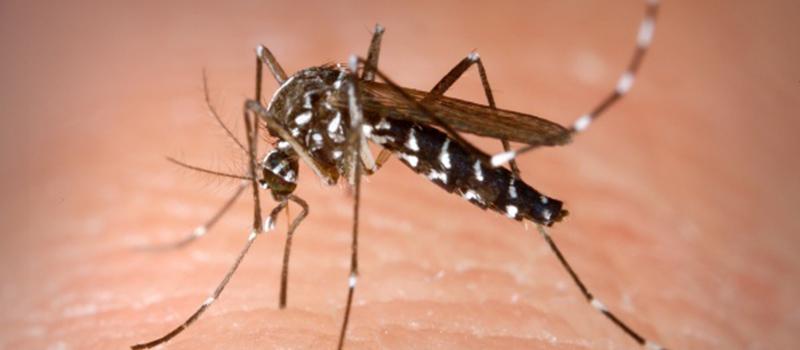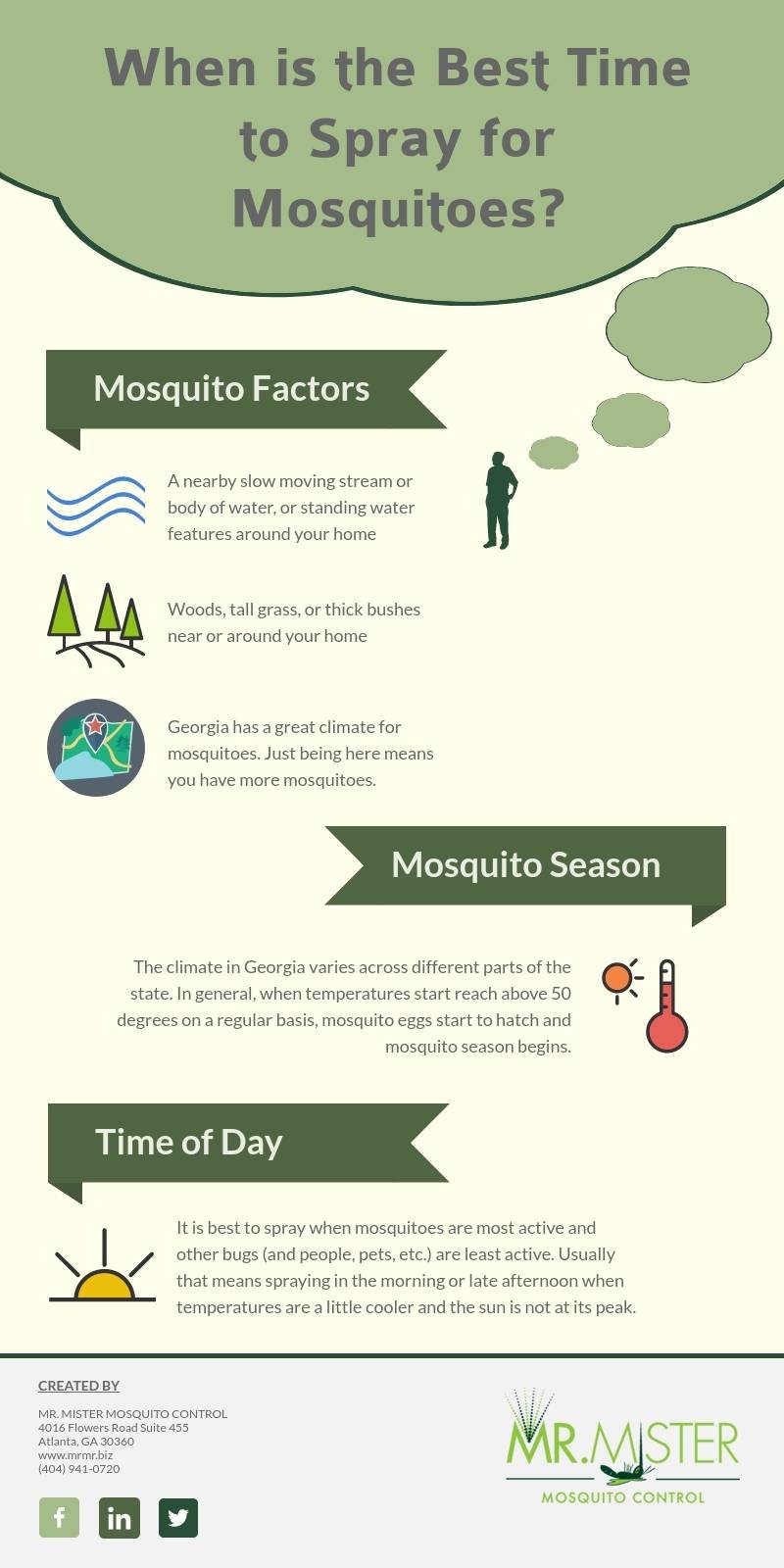The best time to treat for mosquitoes is in April when they are most active. Mosquitoes become most active in April as they seek blood meals and water to lay their eggs.
This is the ideal time to start mosquito yard treatments to effectively reduce their population. Before spraying your yard, it’s important to consider the potential risks of harming the environment, pets, and neighbors. Backyard residual sprays should be applied to mosquito resting sites, such as the sides of homes, around doorways, in tall grass and shrubs, and backyard trees.
Additionally, the most effective time to spray for mosquitoes is when they are most active, typically at dusk and dawn. In warmer regions, mosquito season can begin as early as March.
Introduction To Mosquito Seasonality
Understanding the seasonality of mosquitoes is crucial for effective mosquito control. By knowing the lifecycle of mosquitoes and regional variations in mosquito activity, you can determine the best time to treat for these pesky insects.
Lifecycle Of Mosquitoes
Mosquitoes have four distinct stages in their lifecycle: egg, larva, pupa, and adult. The duration of each stage varies depending on environmental factors such as temperature and humidity. For instance, warmer temperatures can accelerate the development of mosquitoes, leading to a shorter lifecycle.
Regional Variations In Mosquito Activity
Mosquito activity is influenced by regional climate and environmental conditions. In warmer regions, mosquitoes may be active year-round, while in cooler climates, their activity is typically limited to the warmer months. Understanding these regional variations is essential for timing mosquito treatments effectively.

Credit: www.cdc.gov
Pre-season Treatments: Getting Ahead
Pre-season treatments are crucial for effective mosquito control. By taking action before mosquitoes become a nuisance, you can significantly reduce their population and minimize the risk of bites. Let’s explore the importance of early intervention and the specific months when pre-season treatments are most effective.
Importance Of Early Intervention
Early intervention is key to preventing mosquito infestations. By treating your property before the peak mosquito season, you can disrupt their breeding cycle and reduce the overall population. This proactive approach not only provides immediate relief but also offers long-term protection against mosquitoes.
March And April: Crucial Months
March and April are critical months for pre-season mosquito treatments. As the weather warms up, mosquitoes become more active and start breeding. Treating your yard during these months can effectively target mosquito larvae and prevent adult mosquitoes from emerging, leading to a significant reduction in their numbers throughout the season.
Understanding Mosquito Behavior
To effectively treat for mosquitoes, it is crucial to start in April when they are most active, seeking blood meals and water for egg-laying. Implementing yard treatments during this time can help control mosquito populations and prevent potential harm to humans, pets, and the environment.
Dawn And Dusk: Prime Mosquito Hours
Mosquitoes are most active during dawn and dusk. These are the times when you are most likely to get bitten. During the day, mosquitoes rest in cool, dark places like under leaves, in vegetation, or in shaded areas. At night, they emerge to feed on blood. This is why it is important to schedule mosquito treatments during the times when they are most active. By treating your yard during the peak mosquito hours, you can effectively reduce the mosquito population in your area and enjoy a mosquito-free outdoor space.Temperature Thresholds For Activity
Mosquitoes are also sensitive to temperature changes. They are most active when the temperature is between 80 and 90 degrees Fahrenheit. When the temperature rises above 90 degrees, mosquitoes become less active and seek out cooler areas to rest. Similarly, when the temperature drops below 50 degrees, mosquitoes become inactive and will not bite. Knowing the temperature thresholds for mosquito activity can help you plan your mosquito treatments accordingly. It is best to schedule treatments during the times when mosquitoes are most active, which is usually during the warmer months of the year.Overall, understanding mosquito behavior is key to effective mosquito control. By treating your yard during the times when mosquitoes are most active and sensitive to temperature changes, you can effectively reduce the mosquito population in your area and enjoy a mosquito-free outdoor space. Remember to always consider the safety and health of your family, pets, and the environment when choosing a mosquito treatment method.Strategic Treatment Timing
Season Start: Best Practices
When should you start treating for mosquitoes? Beginning in April is crucial as mosquitoes are most active, seeking blood and laying eggs.
Optimal Times Of Day For Spraying
What is the best time to spray for mosquitoes? Effective spraying occurs at dusk and dawn when mosquitoes are most active.
Natural Vs. Chemical Methods
The best time to treat for mosquitoes is when they are most active, typically in the spring when the weather is warming up. Using natural methods like essential oils or chemical sprays can effectively reduce mosquito populations, but it’s important to be cautious with chemical treatments as they can harm beneficial insects and animals.
Pros And Cons Of Chemical Sprays
Chemical sprays provide immediate relief but may harm beneficial insects like bees and butterflies.Eco-friendly Alternatives
Consider using natural methods like citronella candles, essential oils, or mosquito-repelling plants.Introduction: Natural Vs. Chemical Methods
When tackling mosquito problems, it’s essential to weigh the benefits and drawbacks of natural remedies versus chemical solutions.Using natural methods is safer for the environment and healthier for you and your family. However, they may not be as effective as chemical sprays.On the other hand, chemical sprays can provide quick relief from mosquitoes but may pose risks to the ecosystem and human health.Pros And Cons Of Chemical Sprays
- Pros:
- Immediate relief
- Effective in reducing mosquito populations
- Cons:
- Potential harm to beneficial insects
- Health risks for humans and pets
Eco-friendly Alternatives
| Alternative | Benefits |
|---|---|
| Citronella candles | Natural mosquito repellent |
| Essential oils | Safe for the environment |
| Mosquito-repelling plants | Beautiful and functional landscaping |

Credit: nadamosquito.com
Safety Concerns And Considerations
The best time to treat for mosquitoes is in April when they are most active and seeking blood meals and water to lay their eggs. It’s important to be cautious about the chemicals used for yard treatments, as they can harm humans, pets, and the environment.
Consider natural and safe alternatives for mosquito control.
Impact On Health And Environment
When it comes to treating for mosquitoes, safety should be a top priority. Not only can the chemicals used in mosquito treatments harm humans and pets, but they can also have a negative impact on the environment. Before deciding to spray your yard, it’s important to consider the potential effects on your health and the environment. Mosquito treatments can contain chemicals such as pyrethroids, which have been linked to respiratory problems, skin irritation, and other health issues. These chemicals can also harm beneficial insects and wildlife, such as bees and birds, which play an important role in pollinating plants and controlling mosquito populations.Protecting Beneficial Insects And Wildlife
When treating for mosquitoes, it’s important to take steps to protect beneficial insects and wildlife. This can include avoiding spraying during the day when bees and other pollinators are active, and using targeted treatments rather than broad-spectrum pesticides. Targeted treatments can be applied directly to mosquito breeding sites, such as standing water, without affecting other areas of your yard. In addition, using natural mosquito control methods, such as planting mosquito-repelling plants and using mosquito netting, can help reduce the need for chemical treatments.In conclusion, the best time to treat for mosquitoes is when they are most active, typically in the spring and summer months. However, it’s important to consider the potential safety concerns and environmental impacts of mosquito treatments before deciding to spray your yard. By taking steps to protect beneficial insects and wildlife and using targeted treatments, you can help keep your yard mosquito-free while minimizing the potential risks.Professional Vs. Diy Mosquito Control
Mosquitoes are not only a nuisance but also carry serious health risks. When it comes to controlling these pesky insects, you have the option of hiring a professional pest control service or taking a do-it-yourself (DIY) approach. Each method has its own advantages and considerations, so it’s important to understand the differences between them.
Hiring A Pest Control Service
When you hire a professional pest control service, you are tapping into the expertise of trained technicians who have access to professional-grade products and equipment. These professionals can conduct a thorough inspection of your property to identify mosquito breeding and resting areas, and then develop a targeted treatment plan to effectively eliminate mosquitoes. Additionally, pest control services often provide ongoing maintenance to ensure long-term mosquito control.
Effective Home Spraying Techniques
DIY mosquito control involves using over-the-counter products or homemade remedies to treat your property. Effective home spraying techniques include using EPA-approved insecticides, applying larvicides to standing water, and implementing environmental modifications to reduce mosquito breeding sites. It’s crucial to follow product instructions carefully and take safety precautions when using chemical treatments.
Long-term Mosquito Management
To effectively manage mosquitoes long-term, it is crucial to treat when they are most active, typically in the spring. Starting treatments in April targets mosquitoes seeking blood meals and breeding sites, ensuring a proactive approach to mosquito control.
Routine Maintenance And Monitoring
Regular inspection of potential mosquito breeding sites is crucial for effective long-term mosquito management. Eliminating standing water, cleaning gutters, and repairing any leaky outdoor faucets are some routine maintenance tasks that can prevent mosquito infestations. Monitoring these areas for any signs of mosquito larvae can help in taking timely control measures.
Creating A Mosquito-unfriendly Yard
Landscaping with mosquito-repelling plants, such as lavender and citronella, can help in creating a yard that is less attractive to mosquitoes. Installing screens on windows and doors, maintaining a well-trimmed lawn, and removing any clutter or debris can further contribute to making the yard a hostile environment for mosquitoes.
Conclusion: Best Practices Recap
Optimal timing for mosquito treatment starts in April, as mosquitoes become most active. It’s crucial to begin treatments before the season peaks for effective control. Regular yard treatments not only safeguard your family but also protect beneficial insects and wildlife.
Summary Of Optimal Strategies
Timing for mosquito treatment is crucial, with April being a key month due to increased mosquito activity.
Stay Proactive In Mosquito Prevention
Apply residual sprays to mosquito resting sites like home exteriors, doorways, tall grass, and shrubs.

Credit: www.mosquitosquad.com
Frequently Asked Questions
When Should You Start Treating For Mosquitoes?
Start treating for mosquitoes in April, when they become most active and lay eggs. Before spraying your yard, consider the impact on your health, pets, and the environment. Apply residual sprays to mosquito resting sites around your home. Optimal spraying times are at dusk and dawn.
Is It Worth Spraying Your Yard For Mosquitoes?
Spraying your yard for mosquitoes is worth it because it can help reduce mosquito populations. However, it’s important to be cautious as the chemicals can harm you, your pets, and the environment. Consider the facts and potential risks before deciding to spray your yard.
Where Is The Best Place To Spray For Mosquitoes?
The best place to spray for mosquitoes is on their resting sites, such as on the sides of homes, around doorways, in tall grass and shrubs, and even in backyard trees. It’s important to start treating for mosquitoes in April when they become most active and seek blood meals and water to lay their eggs.
However, before spraying, consider the potential harm to yourself, pets, neighbors, and the environment.
Conclusion
Timing is crucial for effective mosquito treatment. Starting in April when mosquitoes are most active ensures better results. However, it’s important to weigh the risks of chemical treatments on the environment and health. Consider natural alternatives and consult experts for safe solutions.
Related posts:

I’m MD Tanvir, and I bring years of expertise gained from working closely with pest control companies to the forefront. My journey in the industry has inspired me to launch Bug Battler, a platform aimed at equipping people with the know-how to combat pests autonomously. Through Bug Battler, I aim to empower individuals with practical insights to tackle pest infestations effectively.

